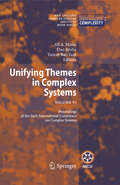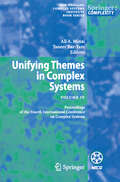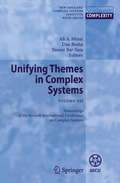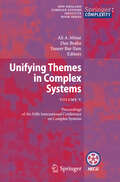- Table View
- List View
Uniform Output Regulation of Nonlinear Systems: A Convergent Dynamics Approach (Systems & Control: Foundations & Applications)
by Alexey Victorovich Pavlov Nathan van de Wouw Henk NijmeijerThis study of the nonlinear output regulation problem embraces local as well as global cases, covering such aspects as controller design and practical implementation issues. From the reviews: "The authors treat the problem of output regulation for a nonlinear control system...[they] develop a global approach to output regulation along familiar lines....I found the book to be ambitious and rigorous, tackling some hard conceptual issues." --IEEE TRANSACTIONS ON AUTOMATIC CONTROL
A Unifying Framework for Formal Theories of Novelty: Discussions, Guidelines, and Examples for Artificial Intelligence (Synthesis Lectures on Computer Vision)
by Terrance Boult Walter ScheirerThis book presents the first unified formalization for defining novelty across the span of machine learning, symbolic-reasoning, and control and planning-based systems. Dealing with novelty, things not previously seen by a system, is a critical issue for building vision-systems and general intelligent systems. The book presents examples of using this framework to define and evaluate in multiple domains including image recognition image-based open world learning, hand-writing and author analysis, CartPole Control, Image Captioning, and Monopoly. Chapters are written by well-known contributors to this new and emerging field. In addition, examples are provided from multiple areas, such as machine-learning based control problems, symbolic reasoning, and multi-player games.
Unifying Perspectives in Computational and Robot Vision (Lecture Notes in Electrical Engineering #8)
by Danica Kragic Ville KyrkiAssembled in this volume is a collection of some of the state-of-the-art methods that are using computer vision and machine learning techniques as applied in robotic applications. Currently there is a gap between research conducted in the computer vision and robotics communities. This volume discusses contrasting viewpoints of computer vision vs. robotics, and provides current and future challenges discussed from a research perspective.
Unifying Petri Nets: Advances in Petri Nets (Lecture Notes in Computer Science #2128)
by Hartmut Ehrig Gabriel Juhas Julia Padberg Grzegorz RozenbergSince their introduction nearly 40 years ago, research on Petri nets has diverged in many different directions. Various classes of Petri net, motivated either by theory or applications, with its own specific features and methods of analysis, have been proposed and studies in depth.These successful developments have led to a very heterogeneous landscape of diverse models, and this, in turn, has stimulated research on concepts and approaches that contribute to unifying and structuring the diverse landscape. This state-of-the-art survey presents the most relevant approaches to unifying Petri nets in a systematic and coherent way. The 14 chapters written by leading researchers are organized in topical sections on application-oriented approaches, unifying frameworks, and theoretical approaches.
Unifying the Software Process Spectrum: International Software Process Workshop, SPW 2005, Beijing, China, May 25-27, 2005 Revised Selected Papers (Lecture Notes in Computer Science #3840)
by Mingshu Li Barry Boehm Leon J. OsterweilThis book constitutes the thoroughly refereed post-proceedings of the International Software Process Workshop, SPW 2005, help in Beijing, China in May 2005. The 30 papers presented here, together with 11 keynote addresses are organized in topical sections on process content, process tools and metrics, process management, process representation and analysis, as well as experience reports.
Unifying Themes in Complex Systems: Vol VI: Proceedings of the Sixth International Conference on Complex Systems
by Ali A. Minai Dan Braha Yaneer Bar-YamIn recent years, scientists have applied the principles of complex systems science to increasingly diverse fields. The results have been nothing short of remarkable: their novel approaches have provided answers to long-standing questions in biology, ecology, physics, engineering, computer science, economics, psychology and sociology. "Unifying Themes in Complex Systems" is a well established series of carefully edited conference proceedings that serve the purpose of documenting and archiving the progress of cross-fertilization in this field. About NECSI: For over 10 years, The New England Complex Systems Institute (NECSI) has been instrumental in the development of complex systems science and its applications. NECSI conducts research, education, knowledge dissemination, and community development around the world for the promotion of the study of complex systems and its application for the betterment of society. NECSI hosts the International Conference on Complex Systems and publishes the NECSI Book Series in conjunction with Springer Publishers.
Unifying Themes in Complex Systems IV: Proceedings of the Fourth International Conference on Complex Systems
by Ali A. Minai Yaneer Bar-YamIn June of 2002, over 500 professors, students and researchers met in Boston, Massachusetts for the Fourth International Conference on Complex Systems. The attendees represented a remarkably diverse collection of fields: biology, ecology, physics, engineering, computer science, economics, psychology and sociology, The goal of the conference was to encourage cross-fertilization between the many disciplines represented and to deepen understanding of the properties common to all complex systems. This volume contains 43 papers selected from the more than 200 presented at the conference. Topics include: cellular automata, neurology, evolution, computer science, network dynamics, and urban planning. About NECSI: For over 10 years, The New England Complex Systems Institute (NECSI) has been instrumental in the development of complex systems science and its applications. NECSI conducts research, education, knowledge dissemination, and community development around the world for the promotion of the study of complex systems and its application for the betterment of society. NECSI hosts the International Conference on Complex Systems and publishes the NECSI Book Series in conjunction with Springer Publishers. ALI MINAI is an Affiliate of the New England Complex Systems Institute and an Associate Professor in the Department of Electrical and Computer Engineering and Computer Science at the University of Cincinnati. YANEER BAR-YAM is President and founder of the New England Complex Systems Institute. He is the author of Dynamics of Complex Systems and Making Things Work: Solving Complex Problems in a Complex World.
Unifying Themes in Complex Systems IX: Proceedings of the Ninth International Conference on Complex Systems (Springer Proceedings in Complexity)
by Alfredo J. Morales Carlos Gershenson Dan Braha Ali A. Minai Yaneer Bar-YamUnifying Themes in Complex Systems is a well-established series of carefully edited conference proceedings that serve to document and archive the progress made regarding cross-fertilization in this field. The International Conference on Complex Systems (ICCS) creates a unique atmosphere for scientists from all fields, engineers, physicians, executives, and a host of other professionals, allowing them to explore common themes and applications of complex systems science. With this new volume, Unifying Themes in Complex Systems continues to establish common ground between the wide-ranging domains of complex systems science.
Unifying Themes in Complex Systems VII: Proceedings of the Seventh International Conference on Complex Systems
by Ali A. Minai Dan Braha Yaneer Bar-YamThe International Conference on Complex Systems (ICCS) creates a unique atmosphere for scientists of all fields, engineers, physicians, executives, and a host of other professionals to explore common themes and applications of complex system science. With this new volume, Unifying Themes in Complex Systems continues to build common ground between the wide-ranging domains of complex system science.
Unifying Themes in Complex Systems , Vol. V: Proceedings of the Fifth International Conference on Complex Systems
by Ali A. Minai Dan Braha Yaneer Bar-YamThe International Conference on Complex Systems (ICCS) creates a unique atmosphere for scientists of all fields, engineers, physicians, executives, and a host of other professionals to explore common themes and applications of complex system science. With this new volume, Unifying Themes in Complex Systems continues to build common ground between the wide-ranging domains of complex system science.
Unifying Themes in Complex Systems X: Proceedings of the Tenth International Conference on Complex Systems (Springer Proceedings in Complexity)
by Dan Braha Marcus A. M. de Aguiar Carlos Gershenson Alfredo J. Morales Les Kaufman Elena N. Naumova Ali A. Minai Yaneer Bar-YamThe International Conference on Complex Systems (ICCS) offers a unique interdisciplinary venue for researchers from the physical and biological sciences, social sciences, psychology and cognitive science, engineering, medicine, human systems, and global systems. This proceedings volume gathers selected papers from the conference. The New England Complex Systems Institute (NECSI) has been instrumental in the development of complex systems science and its applications. NECSI pursues research, education, knowledge dissemination, and community development efforts around the world to promote the study of complex systems and its application for the benefit of society. NECSI hosts the International Conference on Complex Systems and publishes the NECSI Book.
Unifying Theories of Programming: 6th International Symposium, UTP 2016, Reykjavik, Iceland, June 4-5, 2016, Revised Selected Papers (Lecture Notes in Computer Science #10134)
by Jonathan P. Bowen Huibiao ZhuThis book constitutes the refereed proceedings of the 6th International Symposium on Unifying Theories of Programming, UTP 2016, held in Reykjavik, Iceland, in June 2016, in conjunction with the 12th International Conference on Integrated Formal Methods, iFM 2016. The 8 revised full papers presented were carefully reviewed and selected from 10 submissions. They deal with the fundamental problem of combination of formal notations and theories of programming that define in various different ways many common notions, such as abstraction refinement, choice, termination, feasibility, locality, concurrency, and communication. They also show that despite many differences, such theories may be unified in a way that greatly facilitates their study and comparison.
Unifying Theories of Programming: Second International Symposium, UTP 2008, Dublin, Ireland, September 8-10, 2008, Revised Selected Papers (Lecture Notes in Computer Science #5713)
by Andrew ButterfieldUnifying Theories of Programming: First International Symposium, UTP 2006, Walworth Castle, County Durham, UK, February 5-7, 2006, Revised Selected Papers (Lecture Notes in Computer Science #4010)
by Steve Dunne Bill StoddartThis book constitutes the thoroughly refereed post-proceedings of the First International Symposium on Unifying Theories of Programming, UTP 2006, held at Walworth Castle, County Durham, UK, in February 2006. The book presents 14 revised full papers. Based on the pioneering work on unifying theories of programming by Tony Haare and Jifeng He, UTP 2006 focused on the most significant results and raised awareness of the benefits of unifying theoretical frameworks.
Unifying Theories of Programming: 5th International Symposium, UTP 2014, Singapore, May 13, 2014, Revised Selected Papers (Lecture Notes in Computer Science #8963)
by David NaumannThis book constitutes the refereed proceedings of the 5th International Symposium on Unifying Theories of Programming, UTP 2014, held in Singapore, Singapore, in May 13, 2014, co-located with the 19th International Symposium on Formal Methods, FM 2014. The 7 revised full papers presented together with one invited talk were carefully reviewed and selected from 11 submissions. They deal with numerous formal notations and theories of programming, such as abstraction, refinement, choice, termination, feasibility, locality, concurrency and communication.
Unifying Theories of Programming: Third International Symposium, UTP 2010, Shanghai, China, November 15-16, 2010, Proceedings (Lecture Notes in Computer Science #6445)
by Shengchao QinUnifying Theories of Programming: 7th International Symposium, UTP 2019, Dedicated to Tony Hoare on the Occasion of His 85th Birthday, Porto, Portugal, October 8, 2019, Proceedings (Lecture Notes in Computer Science #11885)
by Pedro Ribeiro Augusto SampaioThis volume contains papers presented at UTP 2019, the 7th International Symposium on Unifying Theories of Programming, held in Porto, Portugal, on the 8th of October 2019. This edition of the UTP symposium is in honor of Sir Tony Hoare, on the occasion of his 85th birthday. The papers contained in this volume were invited, and friendly refereed, original contributions sought from the UTP community. One of the papers is from the distinguished invited speaker Tony Hoare himself. Nine other additional papers compose this volume, covering several aspects of Unifying Theories of Programming.
Unifying Theories of Programming: 4th International Symposium, UTP 2012, Paris, France, August 27-28, 2012, Revised Selected Papers (Lecture Notes in Computer Science #7681)
by Burkhard Wolff Marie-Claude Gaudel Abderrahmane FeliachiThis book constitutes the refereed proceedings of the 4th International Symposium on Unifying Theories of Programming, UTP 2012, held in Paris, France, in August 2012, co-located with the 18th International Symposium on Formal Methods, FM 2012. The 8 revised full papers presented together with 2 invited talks and one invited lecture were carefully reviewed and selected from 13 submissions.
Unifying Theories of Programming and Formal Engineering Methods: International Training School on Software Engineering, Held at ICTAC 2013, Shanghai, China, August 26-30, 2013, Advanced Lectures (Lecture Notes in Computer Science #8050)
by Zhiming Liu Jim Woodcock Huibiao ZhuThis book presents 5 tutorial lectures by leading researchers given at the ICTAC 2013 Software Engineering School on Unifying Theories of Programming and Formal Engineering Methods, held in Shanghai, China in August 2013.The lectures are aimed at postgraduate students, researchers, academics, and industrial engineers. They cover topics such as component-based and service-oriented systems, real-time systems, hybrid systems, cyber physical systems, and present techniques such as inductive theorem proving, model checking, correction by construction through refinement and model transformations, synthesis, and computer algebra. Two of the courses are explicitly related to Hoare and He's Unifying Theories of Programming.
Unimagined Futures – ICT Opportunities and Challenges (IFIP Advances in Information and Communication Technology #555)
by Leon Strous Roger Johnson David Alan Grier Doron SwadeThis Festschrift, Unimagined Futures – ICT Opportunities and Challenges, is the first Festschrift in the IFIP AICT series. It examines key challenges facing the ICT community today. While addressing the contemporary challenges, the book provides the opportunity to look back to help understand the contemporary scene and identify appropriate future responses to them. Experts in different areas of the ICT scene have contributed to this IFIP 60th anniversary book, which will be a key input to the ICT community worldwide on setting policy priorities and agendas for the coming decade. In addition, a number of contributions look specifically at the role of professionals and of national, regional, and global organizations in disseminating the benefits of ICT to humanity worldwide.
Uninformed: Why People Seem to Know So Little about Politics and What We Can Do about It
by Arthur LupiaResearch polls, media interviews, and everyday conversations reveal an unsettling truth: citizens, while well-meaning and even passionate about current affairs, appear to know very little about politics. Hundreds of surveys document vast numbers of citizens answering even basic questions about government incorrectly. Given this unfortunate state of affairs, it is not surprising that more knowledgeable people often deride the public for its ignorance. Some experts even think that less informed citizens should stay out of politics altogether. As Arthur Lupia shows in Uninformed, this is not constructive. At root, critics of public ignorance fundamentally misunderstand the problem. Many experts believe that simply providing people with more facts will make them more competent voters. However, these experts fail to understand how most people learn, and hence don't really know what types of information are even relevant to voters. Feeding them information they don't find relevant does not address the problem. In other words, before educating the public, we need to educate the educators. Lupia offers not just a critique, though; he also has solutions. Drawing from a variety of areas of research on topics like attention span and political psychology, he shows how we can actually increase issue competence among voters in areas ranging from gun regulation to climate change. To attack the problem, he develops an arsenal of techniques to effectively convey to people information they actually care about. Citizens sometimes lack the knowledge that they need to make competent political choices, and it is undeniable that greater knowledge can improve decision making. But we need to understand that voters either don't care about or pay attention to much of the information that experts think is important. Uninformed provides the keys to improving political knowledge and civic competence: understanding what information is important to and knowing how to best convey it to them.
Uninterrupted Knowledge Creation: Process Philosophy and Autopoietic Perspectives (SpringerBriefs in Business)
by Kaj U. Koskinen Rainer BreiteA common charge leveled against the autopoietic perspective is that it does not explain change or, consequently, knowledge creation. This book demonstrates that knowledge creation is not always an ongoing process, as is claimed in many process philosophy and autopoietic research works. The author introduces the idea of recursivity, which represents the explanatory potential for uninterrupted knowledge creation and paves the way for interaction between process (e.g. production) and stability (e.g. structure). The book describes the nature and role of recursivity in detail, especially in terms of how a system’s structure and production become media for one another. The book also acknowledges the value of the systems perspective on organizations in management studies, but suggests a different approach to defining systems, one that includes autopoietic elements.
Unique Chips and Systems (Computer Engineering Series)
by Eugene John and Juan RubioWhich came first, the system or the chip? While integrated circuits enable technology for the modern information age, computing, communication, and network chips fuel it. As soon as the integration ability of modern semiconductor technology offers presents opportunities, issues in power consumption, reliability, and form-factor present challenges. The demands of emerging software applications can only be met with unique systems and chips. Drawing on contributors from academia, research, and industry, Unique Systems and Chips explores unique approaches to designing future computing and communication chips and systems.The book focuses on specialized hardware and systems as opposed to general-purpose chips and systems. It covers early conception and simulation, mid-development, application, testing, and performance. The chapter authors introduce new ideas and innovations in unique aspects of chips and system design, then go on to provide in-depth analysis of these ideas. They explore ways in which these chips and systems may be used in further designs or products, spurring innovations beyond the intended scopes of those presented. International in flavor, the book brings industrial and academic perspectives into focus by presenting the full spectrum of applications of chips and systems.
Unique Chips and Systems (Computer Engineering Series)
by Eugene John Juan RubioWhich came first, the system or the chip? While integrated circuits enable technology for the modern information age, computing, communication, and network chips fuel it. As soon as the integration ability of modern semiconductor technology offers presents opportunities, issues in power consumption, reliability, and form-factor present challenges. The demands of emerging software applications can only be met with unique systems and chips. Drawing on contributors from academia, research, and industry, Unique Systems and Chips explores unique approaches to designing future computing and communication chips and systems.The book focuses on specialized hardware and systems as opposed to general-purpose chips and systems. It covers early conception and simulation, mid-development, application, testing, and performance. The chapter authors introduce new ideas and innovations in unique aspects of chips and system design, then go on to provide in-depth analysis of these ideas. They explore ways in which these chips and systems may be used in further designs or products, spurring innovations beyond the intended scopes of those presented. International in flavor, the book brings industrial and academic perspectives into focus by presenting the full spectrum of applications of chips and systems.
Unique Radio Innovation for the 21st Century: Building Scalable and Global RFID Networks
by Damith C. Ranasinghe, Quan Z. Sheng and Sherali ZeadallyAre you an engineer or a researcher developing RFID systems? Are you a manager considering deploying RFID-based applications? If so, this book is for you. Covering modern RFID systems, the challenges to RFID implementation are addressed using specific industrial research examples and common integration issues. The primary focus is on answering questions surrounding building scalable global Internet-based RFID networks. Key topics include RFID data management, RFID data processing and integration, Real-Time Locating Systems (RTLS) and sensors. The book considers the challenges of and solutions to building and exploiting global networks to guarantee one of the most important business drivers for modern RFID technology: traceability. The authors have drawn together RFID applications from the retail supply chain, asset and product lifecycle management, anti-counterfeiting and cold chain management to explore how global traceability networks can be created using RFID and sensor technologies. They present insights from world’s leading research laboratories.























